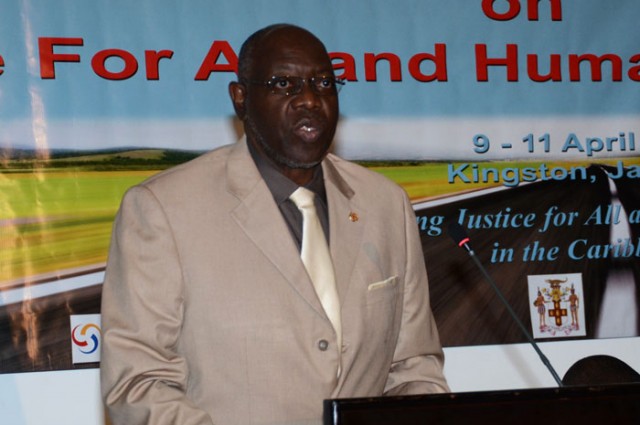 |
| Minister of Health, Hon. Dr. Fenton Ferguson addresses day-two of the PAN-Caribbean Partnership against HIV/AIDS’ (PANCAP) consultation on justice and human rights being held at the Jamaica Pegasus hotel in New Kingston from April 9 to 11. The forum is being held under the theme: ‘Advancing Justice for All and Human Rights in the Caribbean’. |
This is particularly necessary among key populations that are at higher risk of infection, he insists.
“Our culture remains one of the biggest barriers to the type of success we want, in terms of ending stigma and discrimination. Strong cultural and religious beliefs have led to the isolation of some high risk groups,” he stated.
Dr. Ferguson, who was speaking at Thursday’s (April 10) second of a three-day Caribbean Consultation on Justice for All and Human Rights Agenda, at the Jamaica Pegasus Hotel in New Kingston from April 9 to 11, said these majority sentiments continue to interfere with HIV-reduction and treatment among certain groups across the region.
He noted that it will not be easy to tackle many of the deeply embedded systems that form part of the cultural and religious principles of many persons in the region, but said it must be done in order to ensure justice, human rights and proper treatment for all.
Dr. Ferguson further argued that Caribbean leaders have a role to play in ensuring the dignity of all persons and providing equal opportunity for all to strive in society.
“As leaders, we have to put aside our personal beliefs, discomfort, and prejudices. We, therefore, have to initiate frank dialogue on stigma and discrimination,” he stated, further noting that leaders must not shy away from the many issues confronting them, regardless of how “uncomfortable it may be for some of us”.
“HIV and AIDS cannot be about personal interest, it has to be about the greater good,” he stated.
The Health Minister, therefore, said the three-day consultation was timely and important as the region seeks to identify concrete programmes and policies to dismantle structural barriers that deny human rights and impact vulnerability.
He said Caribbean leaders must use the opportunity to identify key elements of the Caribbean road map on the justice for all and human rights agenda as well as determine the measures to be put in place to reduce HIV-related stigma and the elimination of discrimination.
“We also aim to create a facilitative environment and removing discriminatory laws and practices,” he stated.
The Caribbean is the second-most affected region in the world in terms of HIV prevalence, with an estimated 260,000 people living with the disease. Key populations including men who have sex with men, sex workers, people who use drugs and transgender people remain most affected by HIV in Latin America and the Caribbean.
The three-day consultative workshop is part of the PAN-Caribbean Partnership against HIV/AIDS’ (PANCAP) Justice for All and Human Rights campaign and is being held under the theme: ‘Advancing justice for all and human rights in the Caribbean’.
It aims to advance the Caribbean human rights agenda and is the culmination of a series of national consultations held over the past six months, in several Caribbean countries.
Those in attendance at Thursday’s sitting included Prime Minister of St. Kitts and Nevis, Rt. Hon. Dr. Denzil Douglas; Montserrat’s Minister of Health, Education, Community Services and Labour, Colin Riley; and Grenada’s Minister of Health, Dr. Hon. Clarice Modeste Curwen.
The consultation is being coordinated by the PANCAP Coordinating Unit in collaboration with the Joint United Nations Programme on HIV and AIDS (UNAIDS), the Government of Jamaica, and the University of the West Indies, with financial support from the Global Fund.










.mkv_000108708.jpg)
.mkv_000109059.jpg)
.mkv_000113988.jpg)












































+(Light).jpg)











































0 comments:
Post a Comment